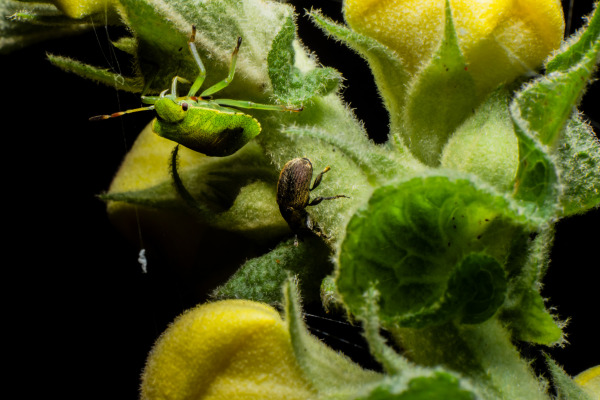Beneficial Visitors, Welcome Guests

Outside my kitchen window is a small herb garden where I have stashed a few tomatoes and peppers. It’s the place where I go for a breath of fresh air. It’s also the place where the insects go, because there’s almost always something in bloom. One of the first things I learned as a Master Gardener is that not all insects are problematic. In fact, many of them are quite beneficial, more so than just the bees and butterflies.
You may know about the praying mantis and the ladybeetle, but what about the assassin bug and the parasitic wasp? These are just a few of the visitors that have a welcome mat in my garden. They find insects of the plant-chewing variety particularly tasty. Believe me, if I find an insect chewing on my basil I’m going to remove it; but often I find that a tiny little helper has beat me to the task. There are many plants that will attract beneficial insects. Nectar-bearing flowers with petals to serve as a handy landing strip is preferred. Dill, parsley, aster, sweet alyssum, candytuft, yarrow, and shasta daisy are only a few from a wide variety of choices.
I have another visitor who is quite fond of his shady hiding place. I have a garden hose spray nozzle that is sensitive to sunlight, so I cover it with a terracotta tray. That dark, moist cubby hole is home to one fat little toad. I know he has been busy, because every time I reach for the hose I notice his waistline has expanded. He’s so tired from his nightly labor that he doesn’t even bother to hop away.
Mixed among the taller plants, I have included a watering hole for the birds. It’s just a shallow dish filled with water. The plants provide cover from predators, while the water offers a cool retreat. And if the birds find a tasty snack on the nearby leaves, then so much the better for me. Robins, bluebirds, baby cardinals, wrens, chickadees, and titmice all feed on insects.
By far the most unusual visitor is the cicada killer. This insect has the appearance of a large hornet, but fortunately is quite unthreatened by my presence near her nest. These bees are solitary, and have underground nests where they lay their eggs. The destructive cicada is the preferred host for the young hatchlings. Only the female is able to sting, and females are not usually aggressive. The males are territorial, but have no stinger. For the past two years, my herb garden has been a nesting ground for as many as 15 of these insects during their egg-laying season.

At the corner boundary of my garden, I have a rock barrier made of flat stones. On cool mornings when the sun touches these stones, a gray lizard comes out to soak up the warmth. This is a particularly welcome guest, because young grasshoppers are no match for his lightning fast reflexes. You can’t garden in Texas without dealing with this aggravating pest, but I have found a helpful little guest who has made himself at home.
I hesitate to mention my last visitor; not because he is unwelcome, but because many would consider him a threat. He is almost 5 feet long and has a distinctive design on his back. Yes, that would be the Texas rat snake, also known as a chicken snake. Now I don’t have chickens, so I’m not particularly worried. I also have a keen eye that easily distinguishes the difference between this welcome visitor and the not-so-welcome copperhead.
There was a time when I wouldn’t have tolerated his presence, but I have noticed that this snake is fond of small rodents such as rats, mice, baby rabbits and baby squirrels. Now that gives me pause. If he can go to the trouble of reducing the population of rabbits that feed on my vegetables and squirrels that raid my bird feeder, then I suppose I can be a little more tolerant of his sneaky-snake ways.
These are the visitors that have made themselves at home in my garden. In fact, I have gone out of my way to make them welcome. They add a hint of excitement to my favorite spot for fresh air. They poke their heads out to say “thank you” for the welcome mat, and I quietly smile my thanks in return; because the results are worth every effort.
